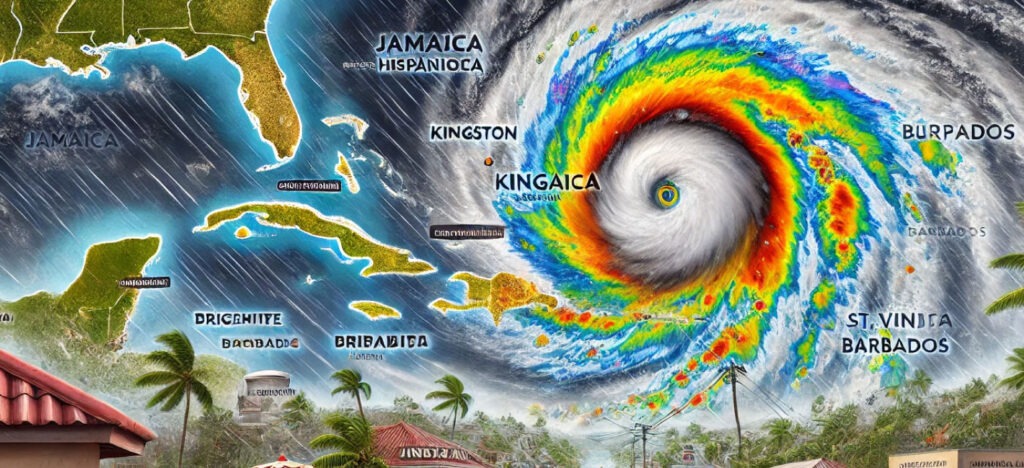Hurricane Beryl strengthens on its way to Jamaica, threatens disaster

Hurricane Beryl strengthened Monday to a "potentially catastrophic" Category 5 storm as it moved through the eastern Caribbean, putting Jamaica close to its path after downing power lines and flooding streets elsewhere.
Hurricane Beryl strengthened Monday to a "potentially catastrophic" Category 5 storm as it moved through the eastern Caribbean, putting Jamaica close to its path after downing power lines and flooding streets elsewhere.
Beryl brings an unusually fierce and early start to this year's Atlantic hurricane season, with scientists saying that climate change likely contributed to the rapid pace of its formation as global warming has increased temperatures in the North Atlantic.
By 11:00 AST (03:00 GMT) Monday, Beryl, with winds up to 160 mph (257 kph), was about 840 miles (1,352 km) east-southeast of Kingston, the capital of Jamaica, according to the U.S. National Hurricane Center (NHC).
The storm hit the Caribbean region earlier in the day as the earliest Category 4 storm on record, rated on the five-point Saffir-Simpson scale.
"Beryl is now a potentially catastrophic Category 5 hurricane," the NHC said in a statement, adding that it was expected to bring life-threatening winds and storm surge to Jamaica later this week.
The storm is expected to dump 4 to 8 inches (10 cm to 20 cm) of rain on Wednesday, increasing to 12 inches (31 cm) in some areas, he said.
On its path, Beryl is expected to drench the island of Hispaniola on Tuesday with 2 to 6 inches (5 cm to 15 cm) of rain as it moves west-northwest at nearly 22 mph (35 kph), the Miami-based hurricane center said.
Jamaica issued a hurricane warning on Monday, while tropical storm warnings were in effect for parts of the southern coasts of the Dominican Republic and Haiti.
On other islands in the eastern Caribbean, residents had boarded up windows, stocked up on food and filled gas tanks as the storm approached.
Earlier on Monday, vehicles were seen driving along a flooded boardwalk in Bridgetown, Barbados.
The Prospect community in San Vicente reported roofs torn off buildings and power outages in some areas.
In Grenada, a reporter said that electricity was down throughout the island.
Officials in Mexico began preparing for Beryl's arrival this week, with the federal government urging authorities and the public to exercise "extreme caution".
Mexico is now assessing the damage in its states of Oaxaca and Veracruz from the heavy rains brought by former tropical storm Chris.
"What worries us is that the watersheds are already saturated," said Cutberto Ruiz, chief meteorologist for Oaxaca's civil protection agency. "So, with minimal rainfall ... the rivers will rise."
Global warming has helped drive North Atlantic temperatures to record highs, causing more surface water to evaporate, which in turn provides additional fuel for more intense hurricanes with higher wind speeds.
In May, the U.S. National Oceanic and Atmospheric Administration predicted above-normal hurricane activity in the Atlantic this year, also noting unusually high ocean temperatures.
Scientists surveyed see powerful Hurricane Beryl as a harbinger of an unusually active hurricane season, made possible by record temperatures in the Atlantic Ocean.
"Climate change is loading the dice for more intense hurricanes to form," said Christopher Rozoff, an atmospheric scientist at the U.S. National Center for Atmospheric Research in Boulder, Colo.
Beryl went from a Category 1 storm to a Category 4 storm in less than 10 hours, said Andra Garner, a New Jersey-based meteorologist.
Scientists have already predicted that events like Beryl will become more likely with climate change, added Garner, whose research has shown that rising water temperatures over the past 50 years have made it more than twice as likely that weak storms will become major hurricanes in less than 24 hours.
On the island of Tobago, a hotel and tourism group said limited damage to hotel properties had been reported.
"The east side of the island took the biggest hit and the seas remain dangerous," said Curtis Douglas, president of the All Tobago Fishermen's Association.
"The fishermen received sufficient warning and were able to get their boats out of the water."
Collaboration: Grupo Auge | Reuters (International).





